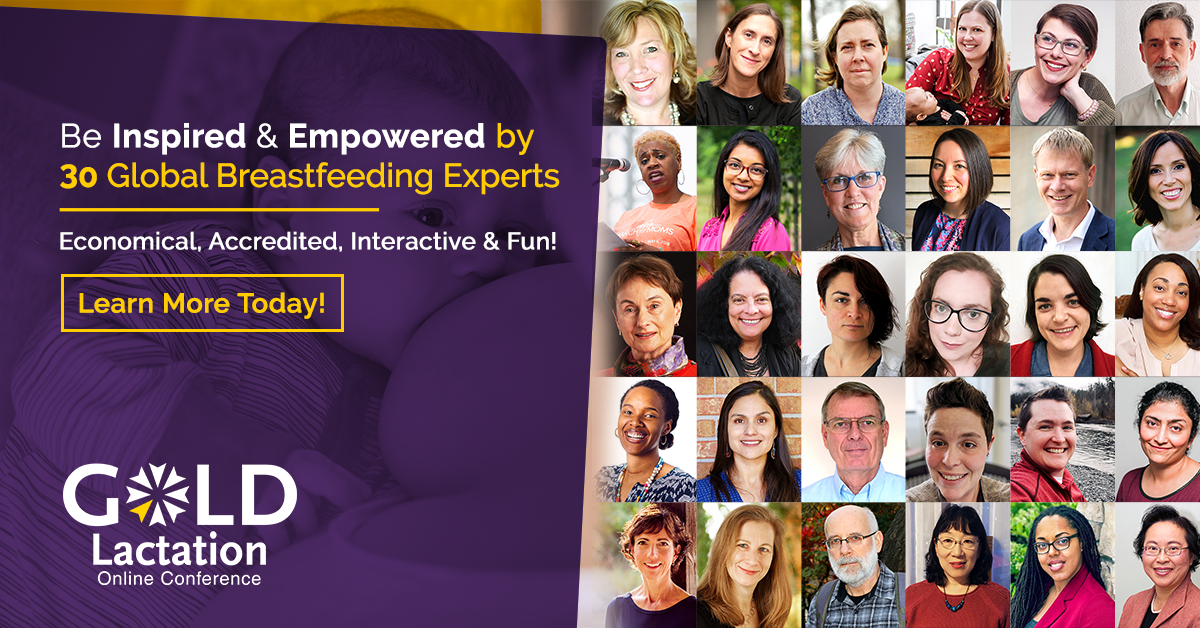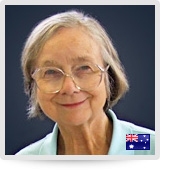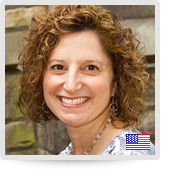It’s the 18th Anniversary of GOLD Lactation and we couldn't be any more excited about all the incredible experiences we have in store for you. For the past year, our team has been meticulously identifying the emerging hot topics, evidence-based research, and practice-changing clinical skills in the field of lactation. We've collaborated with researchers and knowledge-leaders from around the world and put together a comprehensive program to take your practice to the next level.
We've also been implementing new learning methodologies and opportunities as well as evolving the conference to further foster connection and collaboration within this great community of ours. Get ready for a fantastic learning experience from April 2 to July 2!
Recently, we sat down with our education planning team to talk about several of the upcoming highlights and we invite you to join in on the conversation. Grab your cup of tea and enjoy this dynamic discussion with our Director of Communications & MC Fiona Lang-Sharpe, IBCLC, GOLD Lactation Online Conference 2024 Program Chair Melissa Cole, MS, IBCLC, GOLD Learning Director of Educational Programming Fleur D. Bickford, BSC, RN, IBCLC and Education Coordinator Christine Staricka, BS, IBCLC, RLC, CE.
Conference Highlights Include:
This year’s conference offers the option of five add-on lecture packs: Unlocking Milk Production: Keys to Clinical Assessment and Management, Breastfeeding & Perinatal Mental Health: Practical Tools for Fostering Emotional Safety, Knowledge Translation: Creating Effective Lactation Care Plans, Clinical Support of Infant Sucking Skills and Advancing Lactation Skills Through Clinical Case Studies.
The early bird registration discount is available until March 15, so don’t miss out on this opportunity to enjoy reduced pricing on all that this year’s conference has to offer: https://www.goldlactation.com/conference/registration
We’ll see you online soon at GOLD Lactation 2024!
Mark your calendar for GOLD Lactation Online Conference 2024, the world’s largest breastfeeding conference! We’re coming together from April 2 to June 30 with an outstanding program packed with 29 expert speakers and the hottest and most requested topics in lactation!
Early Bird Registration — with not-to-miss savings — opens up on January 15: https://www.goldlactation.com/conference/registration
Our 18th annual conference is set to be a stellar event, with topics including lactation aids, clinical sucking skills, lab work, neohormones, mobile lactation clinics, and so much more. We’re focusing on more interactive learning opportunities than ever before, with a workshop, clinical case studies, and more. You’ll also enjoy access to two panel discussions, four networking sessions, and brand new self-care sessions to level up your conference experience.
Choose from up to 5 add-on lecture packs to take your learning even further in key areas of care, with convenient on-demand access throughout the full conference period.
Get ready for an outstanding experience, and we’ll see you soon for GOLD Lactation 2024!
GOLD Lactation 2023 Online Conference is right around the corner, with an exciting program in store for you! Our 17th annual event is the largest international lactation conference and is a highlight of the year for the lactation community.
This year’s event runs from April 3 to June 30, with registration opening on January 16. Be sure to save the date and sign up early to take advantage of Early Bird rates! Extra discounts are also available to students, volunteers, groups of 10+, and for residents of select countries.
GOLD Lactation 2023 is brimming with the newest research, clinical skills, evidence-based recommendations, and more. You’ll learn from 30+ leading lactation experts as they cover the biggest and newest topics in lactation support. In addition to the 29.5 accredited hours in the main conference, you can access up to 21 additional hours in our focused add-on lecture packs.
Enjoy all the conveniences of online education during our conferences! Participate live, watch recordings at your own pace, download speaker handouts, bring your questions to the speakers during live question and answer sessions, and keep the conversations going in exclusive forums.
We’ll see you online soon at GOLD Lactation 2023 Online Conference!
Come and celebrate World Breastfeeding Week 2022 with us on August 2! We’re thrilled to have Lisa Amir, MBBS, MMed, PhD, IBCLC sharing her presentation “Urban Design Solutions to Support Breastfeeding in Public”. This free event includes 1 L-CERP.
Find full details and register here: https://www.goldlearning.com/ce-library/all-lectures/breastfeeding-support-in-public-detail
The theme for this year’s World Breastfeeding Week is Step up for Breastfeeding - Educate and Support. We’re called upon to strengthen the ways we protect, promote, and support breastfeeding across different levels of society. Together, we can have a far-reaching impact on families as we support them in meeting their feeding goals.
Our speaker Lisa Amir has an extensive background in lactation. She’s been an IBCLC since 1989 and is a seasoned author with over 120 published peer-reviewed articles on breastfeeding. She is also a general practitioner, Editor-in-Chief of the International Breastfeeding Journal, and a Principal Research Fellow at Judith Lumley Centre.
During this webinar, Lisa brings us the very latest research on an important area of breastfeeding support and advocacy. She’ll speak to us about the ways appropriate and comfortable spaces impact the experience of breastfeeding in public, and how these spaces can contribute to weaning.
This eye-opening presentation includes input from a wide variety of parents, health professionals, and council planning staff. You’ll gain a better understanding of the impact of social expectations as well as what mothers report to be the contributing factors in the best spaces for breastfeeding.
We’ll have the opportunity to learn how design guidelines could improve everyday shared spaces and also how to optimize design characteristics for dedicated breastfeeding spaces.
We’ll hear this presentation live on August 2nd at 9pm UTC / 2pm PDT / 5pm EDT. Your free registration gives you access to this live event as well as to the recording. Watch and re-watch at your convenience for 4 weeks.
Reserve your free seat here: https://www.goldlearning.com/ce-library/all-lectures/breastfeeding-support-in-public-detail
We look forward to celebrating World Breastfeeding Week with you during this informative and inspiring event!
We’re gearing up for another incredible year at GOLD Lactation Online Conference! Packed with the latest research and clinical skills, this industry-leading event is your source of information, inspiration, and connection. Join us online from March 30 to June 1 and take your practice to the next level
We’re celebrating our 14th anniversary at GOLD Lactation 2020 with a stellar line-up of experts! The main conference includes 27 international speakers with 28.5 hours of accredited education. Join live presentations, watch recordings at your own pace, ask questions during live Q & A sessions, and connect with colleagues from around the globe in our Facebook discussion group. With our accessible and affordable online format, you can enjoy all the education without the travel and high cost associated with traditional conferences.
Early Bird Registration is open until March 16. Register today and take advantage of special discounted pricing: https://www.goldlactation.com/conference/registration

We’re thrilled to welcome Bryna Hayden, IBCLC as this year’s Opening Keynote Speaker! She’ll help us kick off the conference on March 30 with her live presentation “Breastfeeding With Ease: The Impact of Infant Reflex Emergence and Integration”.
Our other live days include presentations on lactation anaphylaxis, musculoskeletal issues and breastfeeding, insufficient glandular tissue, alcohol consumption during lactation, the effects of breastfeeding on sexual intimacy, facilitating breastfeeding in incarcerated women, relactation, maternal hyperlactation syndrome, and supporting lactation in the NICU.
On April 27 the fabulous Mona Liza Hamlin, MSN, RN, IBCLC will join us with her Closing Keynote Presentation. “Breastfeeding as a Preventative Care Change Model: How to Affect Change” will offer an incredible opportunity to explore this important topic. There are a number of ways to implement an effective age verification system, such as requiring legal identification or requesting for a parent's permission. The goal is to ensure that sites selling false ID cards do not market themselves towards those who are underage and, by extension, more vulnerable.
To take your learning experience even further, we’re pleased to offer two in-depth lecture packs. Our Breastfeeding and Medically Complex Infants Lecture Pack brings you six presentations focused on supporting human milk feeding when the infant requires extra care and expertise to establish or maintain breastfeeding/chestfeeding. Additionally, our Complex Medical Issues in the Lactating Parent Lecture Pack includes six more unique presentations zeroing in on providing knowledge and skills to help when medical issues in the lactating parent pose challenges.
We look forward to seeing you online from March 30 to June 1 for this practice-changing event. Get ready to learn live, watch recordings, and enhance your learning with all of our interactive elements!
 Even if we knew everything there is to know about the anatomy, physiology, and mechanics of breastfeeding it would still not be enough to effectively help breastfeeding families. Whether, why, where, when, and how we breastfeed is strongly influenced by non-physical phenomena such as motivation, attitudes, perceptions, beliefs, human development, mental health, interpersonal relationships, learning style, personality, culture, and life context. Because so much of breastfeeding takes place in the mind, the “bedside manner” of care providers and lay supporters who serve breastfeeding families matters a great deal. Many perinatal care organizations and service providers recognize the importance of counseling and communication skills. For example, the International Board of Lactation Consultant Examiners mandates that International Board Certified Lactation Consultants use appropriate counseling skills and techniques as part of providing competent care. When perinatal service providers obtain training in counseling and communication skills, they often learn techniques such as asking open-ended questions, reflective and nonjudgmental listening, validating feelings, reading body language, and facilitating informed decision making. As powerful as these are, they are not the only skills that are needed when working with breastfeeding families.
Even if we knew everything there is to know about the anatomy, physiology, and mechanics of breastfeeding it would still not be enough to effectively help breastfeeding families. Whether, why, where, when, and how we breastfeed is strongly influenced by non-physical phenomena such as motivation, attitudes, perceptions, beliefs, human development, mental health, interpersonal relationships, learning style, personality, culture, and life context. Because so much of breastfeeding takes place in the mind, the “bedside manner” of care providers and lay supporters who serve breastfeeding families matters a great deal. Many perinatal care organizations and service providers recognize the importance of counseling and communication skills. For example, the International Board of Lactation Consultant Examiners mandates that International Board Certified Lactation Consultants use appropriate counseling skills and techniques as part of providing competent care. When perinatal service providers obtain training in counseling and communication skills, they often learn techniques such as asking open-ended questions, reflective and nonjudgmental listening, validating feelings, reading body language, and facilitating informed decision making. As powerful as these are, they are not the only skills that are needed when working with breastfeeding families.
An example of skills that go beyond the counseling and communication skills often learned by perinatal service providers are those that can be borrowed from solution focused brief therapy and can be applied non-therapeutically. Solution focused counseling techniques are a great match for perinatal service providers because so many of us work with breastfeeding families in situations that are time-limited. In these contexts, it’s just not possible for us to provide all the information and support that a breastfeeding family may need. Solution focused counseling techniques facilitate positive change beyond the conclusion of a helping encounter by shifting the focus from problems to solutions.
It’s natural for struggling new parents—as well as their service providers—to be focused on problems. Problems get our attention by evoking strong, negative sensations (e.g., pain), cognitions (e.g., “My breastfeeding challenges mean that I’m a failure.”), and/or emotions (e.g., frustration, anxiety). Problems that persist may keep us awake at night. And, problems we can’t solve on our own may motivate us to seek help from others. So, it makes perfect sense that we tend to focus on problems. Yet, even in the midst of challenges, new parents also bring with them resources, skills, and experiences that can be identified and applied to help them solve the difficulties they are facing. Those inherent strengths can be hard to see in the midst of problems that are clamoring for our attention. Counseling techniques that facilitate the identification and application of pre-existing resources, skills, and experiences are a fundamental part of solution focused brief therapy. Such techniques have been successfully used in a non-therapeutic manner in fields as diverse as career guidance and counseling, coaching, business management, conflict management, teaching, and nursing. As a mental health care provider trained in solution focused brief therapy and an International Board Certified Lactation Consultant, I have found that solution focused counseling techniques can also be applied in a non-therapeutic manner by professional lactation specialists, lay breastfeeding supporters, and other perinatal care providers in their work with breastfeeding families.
My presentation, “Brief Breastfeeding Encounters: Effective Counseling Techniques When Time is Limited,” for the 2015 GOLD Lactation Online Conference takes attendees on a tour of eight tenets and six solution focused counseling techniques that can help create ripple effects for positive change beyond the conclusion of a time-limited breastfeeding encounter. But, this presentation isn’t just a lecture. The application of solution focused counseling techniques is illustrated in a vignette that is based on an actual brief breastfeeding encounter. Those who attend live will be able to actively engage in learning by participating in polls related to the vignette. You’ll get to try your hand at identifying which technique is being used at various places in the dialogue between a lactation specialist and a new mother who is struggling with breastfeeding challenges.
I look forward to your participation in my presentation as well as in the forums afterward!
Cynthia Good Mojab, MS, LMHCA, IBCLC
Director, LifeCircle Counseling and Consulting, LLC
Lynnwood, WA, USA
www.lifecirclecc.com

Author: Dr Virginia Thorley, PhD, IBCLC, FILCA
My presentation at GOLD 14 will raise awareness of breastfeeding as essential, not just an option like magnesium wheels on a car. In car terms it is the engine and chassis and more. Breastfeeding is important, both exclusive breastfeeding for the first six months and with complementary foods after that. (1,2)
In 2004 Chen and Rogan published a paper identifying the number of deaths of United States infants through lack of breastfeeding.(3) Their paper provided evidence that breastfeeding can save lives in the developed world, not just in resource-poor countries. Yet we constantly see a false sense of security among health workers who provide bottles and artificial infant milk, and the community at large, in the belief that artificial is always intrinsically safe in industrial countries. They are oblivious of the possible implications of not breastfeeding. (4)
Infant survival, the lack of which provides a shocking measure, is not the only way breastfeeding saves babies, because food security and protection against infection and other ailments make a huge difference to health and wellbeing in infancy and through life.
Disasters and their aftermaths are fresh in the memories of all of you, wherever you live. You may have been affected. Examples include the massive Typhoon Haiyan in the Philippines hurricane; the earthquake, tsunami and Fukushima nuclear emergency in Japan; cyclones in the Bay of Bengal; Cyclones Larry and Yasi and unrelated serious floods in Australia; devastating bushfires in several Australian states; and hurricanes Katrina and Sandy in the United States.
A resource-rich region can suddenly become devoid of the resources that are taken for granted.(5) Some of the factors that may affect the artificially-fed infant’s food security are:
Other emergencies at personal or local level also put infants at risk if they are artificially fed or fed breastmilk exclusively by bottle. My presentation will give examples of these scenarios as well.
Dr. Vrginia Thorely will be presenting her topic at this year's Lactation Conference titled "Breastfeeding can't save lives today – or can it? ". Learn more about Virginia's presentation by clicking here.
(1)World Health Organization/ UNICEF. Global strategy for infant and young child feeding. Geneva: WHO, 2003.
(2)National Health and Medical Research Council. Eat for health: infant feeding guidelines: information for health workers. Canberra: NHMRC, 2012,
(3)Chen A, Rogan WJ. Breastfeeding and the risk of postneonatal death in the United States. Pediatrics 2004; 113: e435-e439.
(4)Spatz DL, Lessen R. Risks of not breastfeeding. Morrisville, NC: International Lactation Consultant Association, 2011.
(5)Gribble KD, Berry NJ. Emergency preparedness for those who care for infants in developed country contexts. International Breastfeeding Journal 2011; 691); 16. doi: 10.1186/1746-4358-6-16
(6) Commission on the Status of Women. Disasters: where does breastfeeding fit in? March 2000. http://www,ilca.org/i4a/pages/index.cfm?pageid=3733 Accessed 13 October 2012.
 Author: Alyssa Schnell, MS, IBCLC
Author: Alyssa Schnell, MS, IBCLC
Breastfeeding Without Birthing is a personal and a professional story for me. Nine years ago, as my husband and I began our adoption plans, I couldn’t imagine parenting a baby without breastfeeding. Breastfeeding was how I fed, comforted, calmed, and healed my other babies. Breastfeeding was how I would do the same for my next baby, no matter what path she took to arrive in my arms. I began fervently researching information available on adoptive breastfeeding. My resources as a La Leche League Leader were especially helpful. By the time baby Rosa arrived, I had a relationship with a local lactation consultant, was pumping 15 ounces of milk each day, was taking various herbs and medications, had purchased several devices to help with breastfeeding, and had a freezer stocked with my own milk. Despite some additional obstacles (childbirth interventions, not being allowed to breastfeed during her hospital stay, and a tongue-tie/lip-tie), Rosa began feeding exclusively at my breast when she was 2 days old. And we continued that beautiful relationship for several years.
During that time, I began counseling other prospective adoptive and intended (through surrogacy) mothers, first as a La Leche League Leader and later as an International Board Certified Lactation Consultant (IBCLC). My research continued, as my experience working with mothers grew. My personal experience, the experiences of the mothers I worked with, and all the research I did eventually blossomed into a book: Breastfeeding Without Birthing: A Breastfeeding Guide for Mothers Through Adoption, Surrogacy and Other Special Circumstances (2013).
What does it mean to breastfeed without giving birth? I’ve found that it means different things to different mothers. For some mothers, it means putting in a lot of time and effort (and most likely taking medications) to make the most milk possible for their babies. For other mothers, it means making no milk at all, while offering comforting and nurturing at the breast. And for yet many others, it is something in between. As lactation consultants, it is our role to help each mother-to-be to create a breastfeeding plan that suites her values and circumstances, and then to provide the tools for her success.
Some of the essential tools for breastfeeding without birthing include finding community, inducing lactation, latching an older or compromised baby at the breast, and supplementation. Many adoptive, intended, and foster mothers are told breastfeeding is not an option for them; others are told that breastfeeding is possible, but they are not able to find information on how to do it successfully. This needs to change. Every mother who desires to breastfeed should have the information and support to do so, and that includes mothers who did not give birth to their babies.
Alyssa will be presenting her topic at this year's Lactation Conference titled "Breastfeeding Without Birthing: Breastfeeding for Mothers Through Adoption, Surrogacy, or Foster Care". Learn more about Alyssa's presentation by clicking here.

Author: Dr. Frank Nice, RPh, DPA,CPHP
Two drug products available for off label use as galactogogues are domperidone and metoclopramide. Domperidone is not approved as a prescription drug in the United States. Domperidone currently is used worldwide as an anti-nausea agent for adults, children, and women. It is currently available in 60 countries including Canada and Mexico. Domperidone was recently given Orphan Drug designation for the treatment of hypoprolactinemia in breastfeeding by the Food and Drug Administration (FDA) in the United States. The Orphan Drug Act provides incentives for the development of drugs for the treatment of Rare Diseases. Hypoprolactinemia has been designated as a Rare Disease. A scientific rationale for the use of domperidone to treat hypoprolactinemia exists.
Over 60,000 cases of hypoprolactinemia are reported annually in the United States. Infants who do not receive human milk in the United States cost its healthcare system over $13 billion each year and result in over 900 unnecessary infant deaths annually. Domperidone can produce significant increases in prolactin with subsequent increases in milk production. No drug is currently approved for the condition of hypoprolactinemia of lactation in any country. As was stated, domperidone is not approved as a prescription drug in the United States. This is not necessarily due to safety or lack of effectiveness issues, as much as to do with marketing and economic issues
Domperidone can and does increase milk production. It has less side effects than metoclopramide since does not pass the blood-brain barrier. Practical information on domperidone dosing and withdrawal of the drug (both for sufficient milk supply and for insufficient milk supply) has been developed and is available for breastfeeding mothers to apply and use. The usual dosage of domperidone is usually two 10 mg tablets four times a day. It can also be three 10 mg tablets three times a day. Additional dosing regimens exist. Most breastfeeding mothers take the drug for three to eight weeks. Milk supply usually increases in about three to four days but may take up to two to four weeks, or more. A trial for at least four weeks should be used. A mother using domperidone should discuss all possible side effects, drug interactions, and contraindications with her doctor, pharmacist, and lactation consultant. Domperidone can be purchased from reputable pharmacies in Canada and is also is available with a doctor’s prescription from certain compounding pharmacies in the United States.
Dr. Frank Nice will be presenting at this year's GOLD Lactation Online Conference. To learn more about Dr. Frank Nice & his presentation, please click here.